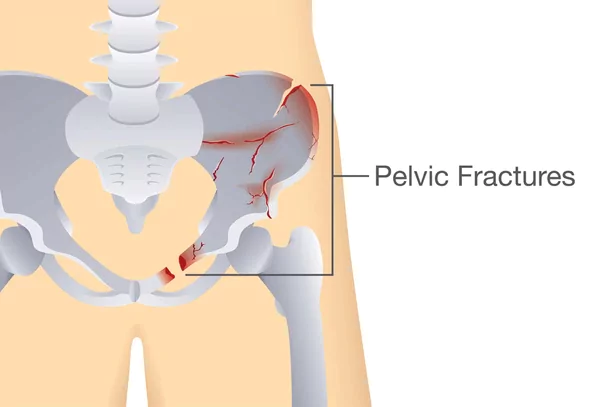A pelvic fracture is a serious injury that affects the stability and function of the pelvic bones. It can result from high-impact trauma, falls, or underlying bone conditions.
If left untreated, pelvic fractures can lead to severe complications, including mobility issues and chronic pain.
Early diagnosis and the right treatment approach are essential for recovery.
Dr. Reet Mukhopadhyay is renowned as the best pelvic fracture surgeon in Kolkata, offering expert treatment for all types of pelvic fractures.
This guide explores the causes, symptoms, diagnosis, treatment options, and prevention strategies for pelvic fractures.

What is a Pelvic Fracture?
A pelvic fracture refers to a break or crack in any part of the pelvic bone, which includes the hip bones, sacrum, and coccyx.
The severity of a pelvic fracture can range from minor cracks to life-threatening injuries that require immediate medical attention.
These fractures can significantly impact mobility and daily activities.
Types of Pelvic Fractures
Pelvic fractures can be classified based on their severity and cause.
The common types include:
- Stable Pelvic Fractures
- Involves minor cracks without displacement of bones.
- Typically caused by low-impact injuries, such as falls from standing height.
- Unstable Pelvic Fractures
- Severe fractures where the pelvic bones are displaced.
- Often caused by high-impact trauma, such as car accidents.
- Acetabular Fractures
- A fracture that affects the hip socket.
- Usually associated with hip dislocations and may require surgical intervention.
- Open vs. Closed Pelvic Fractures
- Open fractures: The broken bone pierces the skin, increasing the risk of infection.
- Closed fractures: The bone remains within the body but may cause internal damage.

Common Causes of Pelvic Fractures
Pelvic fractures can result from various factors, including:
- High-impact trauma: Car accidents, sports injuries, or falls from height.
- Osteoporosis: Weakened bones in elderly individuals, making them prone to fractures.
- Pathological conditions: Diseases like bone cancer can weaken bones, leading to fractures.
- Repetitive stress: Long-term strain on the pelvis, often seen in athletes.
Symptoms of Pelvic Fracture
Pelvic fractures can cause a range of symptoms, including:
- Severe pain in the pelvic region.
- Difficulty standing, walking, or moving the legs.
- Swelling, bruising, or tenderness around the pelvis.
- Numbness or tingling in the legs due to nerve compression.
- Signs of internal bleeding (low blood pressure, dizziness, or abdominal pain).
If you experience any of these symptoms, seek immediate medical attention from a pelvic fracture surgeon in Kolkata.
How is a Fractured Pelvis Diagnosed?
- Physical Examination
- Doctors assess pain, swelling, and movement restrictions.
- Imaging Tests
- X-rays: Detect fractures and bone alignment issues.
- CT Scans: Provide detailed images for complex fractures.
- MRI Scans: Identify soft tissue and ligament damage.
- Additional Diagnostic Tests
- Blood tests to check for internal bleeding.
- Ultrasound to examine internal organ damage.
Pelvic Fracture Treatment in Kolkata
Non-Surgical Treatment Options
- Bed rest and immobilization for minor fractures.
- Pain management with medications.
- Physical therapy to regain mobility.
Surgical Treatment for Pelvic Fractures
- External fixation: Stabilizing bones using screws and metal rods.
- Open reduction and internal fixation (ORIF): Realigning and securing bones with plates and screws.
- Pelvic reconstruction surgery for severe cases.
Dr. Reet Mukhopadhyay is a leading specialist in pelvic fracture treatment in Kolkata, ensuring precise diagnosis and effective surgical intervention.
How to Prevent Pelvic Fractures?
- Maintain bone health: Adequate calcium and vitamin D intake.
- Fall prevention: Use assistive devices and ensure a safe home environment.
- Exercise regularly: Strengthen muscles to support pelvic stability.
- Manage osteoporosis: Regular screenings and medications if necessary.
Recovery and Rehabilitation After Pelvic Fracture
- Expected recovery time depends on fracture severity.
- Physical therapy helps regain mobility and strength.
- Lifestyle adjustments ensure long-term pelvic health.
FAQs About Pelvic Fractures
- How long does it take to recover from a pelvic fracture?
Recovery time varies based on the severity of the fracture. Minor fractures may heal in 6–8 weeks, while severe cases requiring surgery can take several months. Physical therapy speeds up recovery.
- Can you walk with a fractured pelvis?
Walking with a pelvic fracture depends on the severity. Stable fractures may allow limited movement, while unstable fractures require immobilization and medical support.
- Do all pelvic fractures require surgery?
Not all pelvic fractures need surgery. Stable fractures often heal with rest and therapy, while unstable or displaced fractures require surgical intervention.
- What are the risks of untreated pelvic fractures?
Untreated fractures can lead to chronic pain, nerve damage, mobility issues, and complications like internal bleeding. Seeking immediate medical care is crucial.
- Where can I find the best pelvic fracture treatment in Kolkata?
Dr. Reet Mukhopadhyay is a highly experienced pelvic fracture surgeon in Kolkata, providing advanced treatment and personalized care for patients.
Conclusion
Pelvic fractures can be life-altering if not treated properly. Early diagnosis, proper medical intervention, and rehabilitation are key to a full recovery.
If you or a loved one is suffering from a pelvic fracture, consult Dr. Reet Mukhopadhyay, the best pelvic fracture surgeon in Kolkata, for expert treatment and care.
For appointments and consultations, contact Dr. Reet Mukhopadhyay today!

